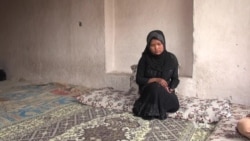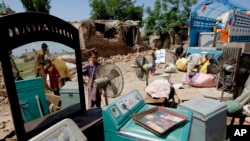Hadeesa is only 14 years old, but her face already shows the signs of life weighing her down. She manages the family’s meager resources, takes care of a sick mother, and tends to a younger brother who gets beaten at work. Her father and brothers together make less than $40 a month, half of which goes towards the rent.
“We only eat bread with tea and pay rent," she says. "We can’t afford anything else.”
Hadeesa is one of more than 70,000 undocumented refugees that have returned to Afghanistan from Pakistan this year, according to the International Organization for Migration (IOM).
Her mother Nukhbat Bibi complains their life has gone from “bad to worse.” In Pakistan they used to be in trouble due to lack of legal documentation, while in Afghanistan they have no money, no decent jobs, and no resources to manage their existence.
Pakistan started cracking down on undocumented Afghan refugees after a devastating attack on a school in the northern city of Peshawar that killed 150 people, mostly children.
The result was a spike in the number of people who either voluntarily returned to Afghanistan or were deported. Many arrived with no money and just the clothes they were wearing. Often these returnees had been living in Pakistan for decades. Some had grown up in Pakistan and had never been to Afghanistan in their lives. They frequently returned to communities where they did not have strong connections.
The areas of the highest returns, like the Kunhar and Kunduz provinces, are rife with conflict. So many returnees could not go to their family villages, and became secondarily displaced inside Afghanistan.
Thirty percent of the returnees need help. Mathew Graydon, the spokesman for IOM in Kabul, said they had the resources to help only 10 percent, which meant that only the most vulnerable received some assistance.
“This has caused a major strain on the resources of the government and IOM to provide assistance to these people,” he said.
Approximately half of the three million Afghan refugees living in Pakistan have no documents. Pakistan has agreed to register them, which would give them a legal status and bring them under the auspices of UNHCR.
Syed Hussain Alemi Balkhi, Afghanistan’s Minister for Refugees and Repatriation, told reporters in Kabul that Pakistan and Iran, another country with a high number of undocumented Afghans, have agreed to grant refugee status to them once Afghanistan identified them through bilateral committees that would start working by the end of June.
He also assured the host countries that Afghanistan has made multiple plans to facilitate voluntary repatriation of the Afghan refugees. Qazi M. Khalilullah, spokesman for Pakistan’s foreign affairs ministry, said his country is working “closely” with Afghanistan and UNHCR to “devise modalities and realistic time lines for the return of Afghanistan refugees.”
“Efforts are also being made for mobilizing international support and resources for creating [a] necessary pull factor inside Afghanistan to incentivize the return of refugees,” he added.
But many refugees in Pakistan said they do not want to return to Afghanistan due to the fragile security situation and lack of economic opportunities. Some of those who returned, like Hadeesa’s family, are struggling to survive.






